International Strategy as Key Determinants
VerifiedAdded on 2022/09/17
|10
|2682
|24
AI Summary
Contribute Materials
Your contribution can guide someone’s learning journey. Share your
documents today.
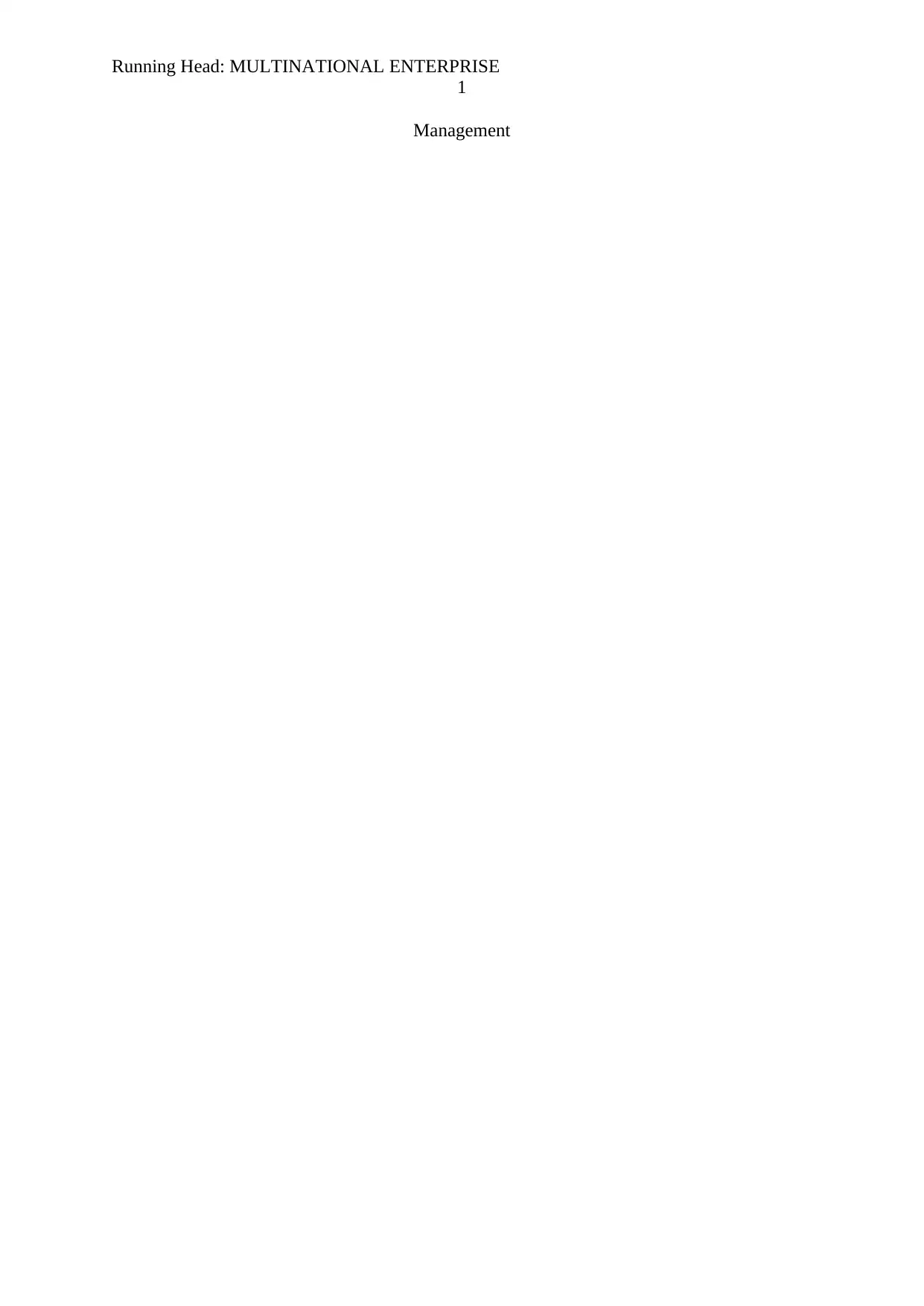
Running Head: MULTINATIONAL ENTERPRISE
1
Management
1
Management
Secure Best Marks with AI Grader
Need help grading? Try our AI Grader for instant feedback on your assignments.
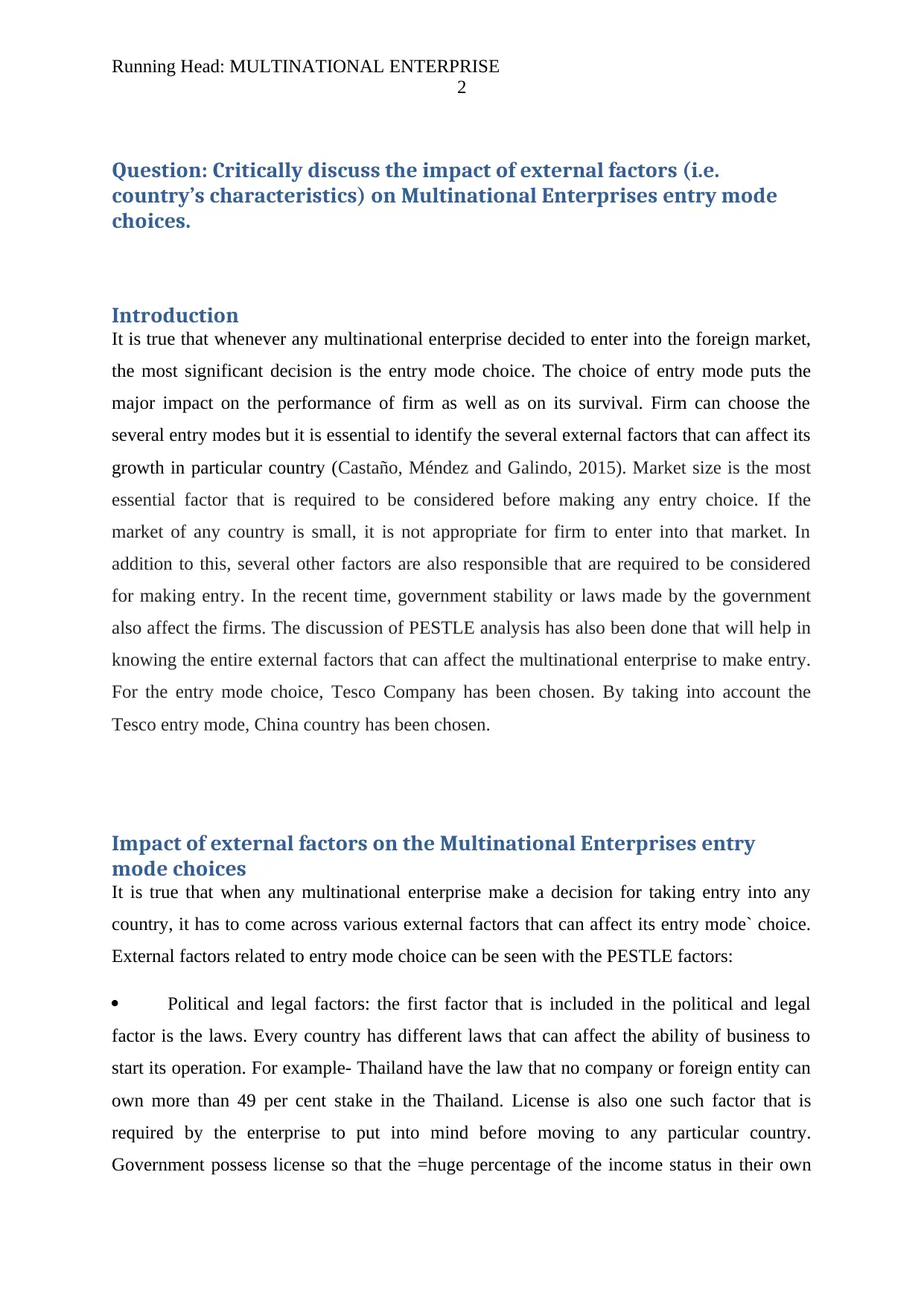
Running Head: MULTINATIONAL ENTERPRISE
2
Question: Critically discuss the impact of external factors (i.e.
country’s characteristics) on Multinational Enterprises entry mode
choices.
Introduction
It is true that whenever any multinational enterprise decided to enter into the foreign market,
the most significant decision is the entry mode choice. The choice of entry mode puts the
major impact on the performance of firm as well as on its survival. Firm can choose the
several entry modes but it is essential to identify the several external factors that can affect its
growth in particular country (Castaño, Méndez and Galindo, 2015). Market size is the most
essential factor that is required to be considered before making any entry choice. If the
market of any country is small, it is not appropriate for firm to enter into that market. In
addition to this, several other factors are also responsible that are required to be considered
for making entry. In the recent time, government stability or laws made by the government
also affect the firms. The discussion of PESTLE analysis has also been done that will help in
knowing the entire external factors that can affect the multinational enterprise to make entry.
For the entry mode choice, Tesco Company has been chosen. By taking into account the
Tesco entry mode, China country has been chosen.
Impact of external factors on the Multinational Enterprises entry
mode choices
It is true that when any multinational enterprise make a decision for taking entry into any
country, it has to come across various external factors that can affect its entry mode` choice.
External factors related to entry mode choice can be seen with the PESTLE factors:
Political and legal factors: the first factor that is included in the political and legal
factor is the laws. Every country has different laws that can affect the ability of business to
start its operation. For example- Thailand have the law that no company or foreign entity can
own more than 49 per cent stake in the Thailand. License is also one such factor that is
required by the enterprise to put into mind before moving to any particular country.
Government possess license so that the =huge percentage of the income status in their own
2
Question: Critically discuss the impact of external factors (i.e.
country’s characteristics) on Multinational Enterprises entry mode
choices.
Introduction
It is true that whenever any multinational enterprise decided to enter into the foreign market,
the most significant decision is the entry mode choice. The choice of entry mode puts the
major impact on the performance of firm as well as on its survival. Firm can choose the
several entry modes but it is essential to identify the several external factors that can affect its
growth in particular country (Castaño, Méndez and Galindo, 2015). Market size is the most
essential factor that is required to be considered before making any entry choice. If the
market of any country is small, it is not appropriate for firm to enter into that market. In
addition to this, several other factors are also responsible that are required to be considered
for making entry. In the recent time, government stability or laws made by the government
also affect the firms. The discussion of PESTLE analysis has also been done that will help in
knowing the entire external factors that can affect the multinational enterprise to make entry.
For the entry mode choice, Tesco Company has been chosen. By taking into account the
Tesco entry mode, China country has been chosen.
Impact of external factors on the Multinational Enterprises entry
mode choices
It is true that when any multinational enterprise make a decision for taking entry into any
country, it has to come across various external factors that can affect its entry mode` choice.
External factors related to entry mode choice can be seen with the PESTLE factors:
Political and legal factors: the first factor that is included in the political and legal
factor is the laws. Every country has different laws that can affect the ability of business to
start its operation. For example- Thailand have the law that no company or foreign entity can
own more than 49 per cent stake in the Thailand. License is also one such factor that is
required by the enterprise to put into mind before moving to any particular country.
Government possess license so that the =huge percentage of the income status in their own
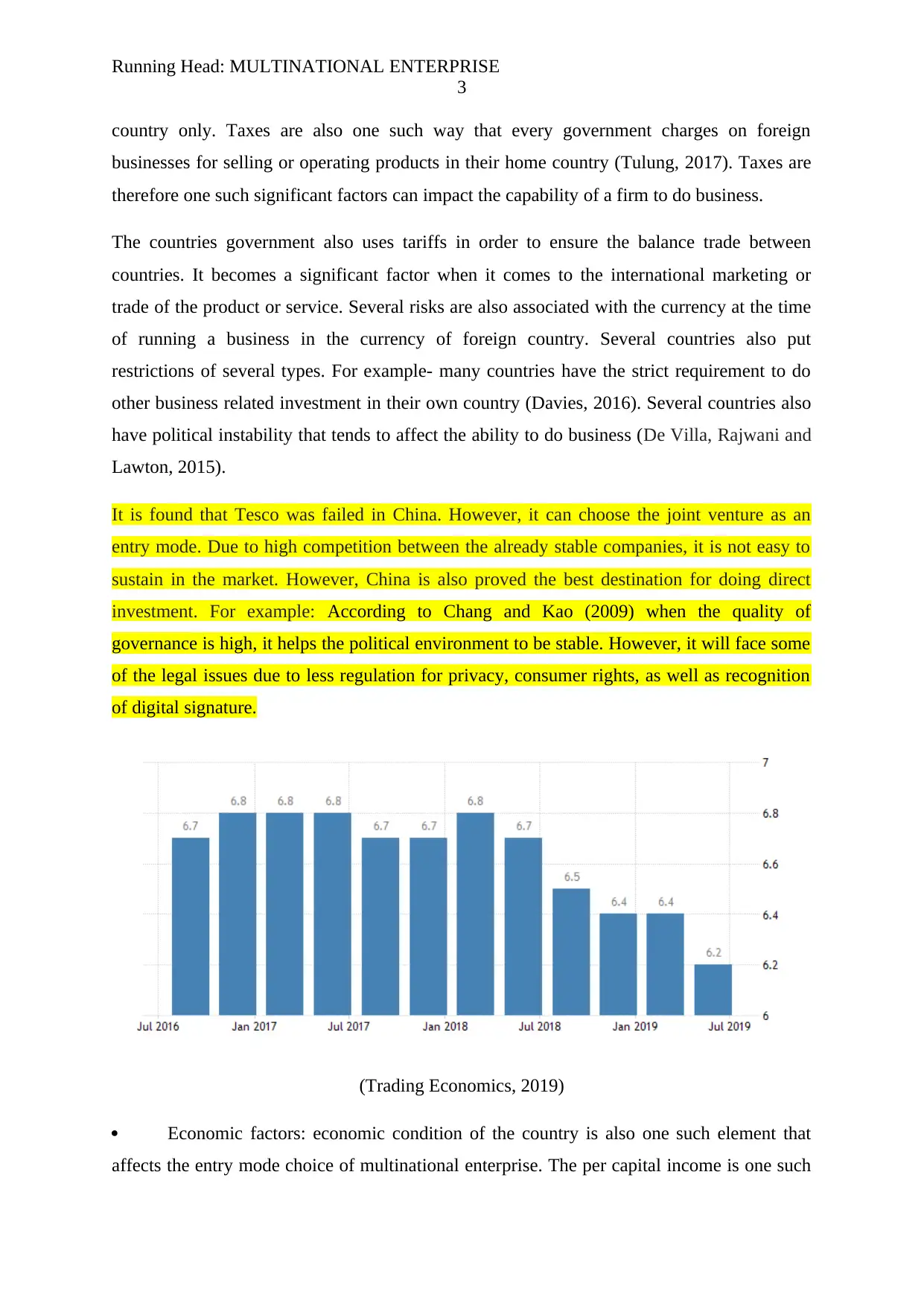
Running Head: MULTINATIONAL ENTERPRISE
3
country only. Taxes are also one such way that every government charges on foreign
businesses for selling or operating products in their home country (Tulung, 2017). Taxes are
therefore one such significant factors can impact the capability of a firm to do business.
The countries government also uses tariffs in order to ensure the balance trade between
countries. It becomes a significant factor when it comes to the international marketing or
trade of the product or service. Several risks are also associated with the currency at the time
of running a business in the currency of foreign country. Several countries also put
restrictions of several types. For example- many countries have the strict requirement to do
other business related investment in their own country (Davies, 2016). Several countries also
have political instability that tends to affect the ability to do business (De Villa, Rajwani and
Lawton, 2015).
It is found that Tesco was failed in China. However, it can choose the joint venture as an
entry mode. Due to high competition between the already stable companies, it is not easy to
sustain in the market. However, China is also proved the best destination for doing direct
investment. For example: According to Chang and Kao (2009) when the quality of
governance is high, it helps the political environment to be stable. However, it will face some
of the legal issues due to less regulation for privacy, consumer rights, as well as recognition
of digital signature.
(Trading Economics, 2019)
Economic factors: economic condition of the country is also one such element that
affects the entry mode choice of multinational enterprise. The per capital income is one such
3
country only. Taxes are also one such way that every government charges on foreign
businesses for selling or operating products in their home country (Tulung, 2017). Taxes are
therefore one such significant factors can impact the capability of a firm to do business.
The countries government also uses tariffs in order to ensure the balance trade between
countries. It becomes a significant factor when it comes to the international marketing or
trade of the product or service. Several risks are also associated with the currency at the time
of running a business in the currency of foreign country. Several countries also put
restrictions of several types. For example- many countries have the strict requirement to do
other business related investment in their own country (Davies, 2016). Several countries also
have political instability that tends to affect the ability to do business (De Villa, Rajwani and
Lawton, 2015).
It is found that Tesco was failed in China. However, it can choose the joint venture as an
entry mode. Due to high competition between the already stable companies, it is not easy to
sustain in the market. However, China is also proved the best destination for doing direct
investment. For example: According to Chang and Kao (2009) when the quality of
governance is high, it helps the political environment to be stable. However, it will face some
of the legal issues due to less regulation for privacy, consumer rights, as well as recognition
of digital signature.
(Trading Economics, 2019)
Economic factors: economic condition of the country is also one such element that
affects the entry mode choice of multinational enterprise. The per capital income is one such
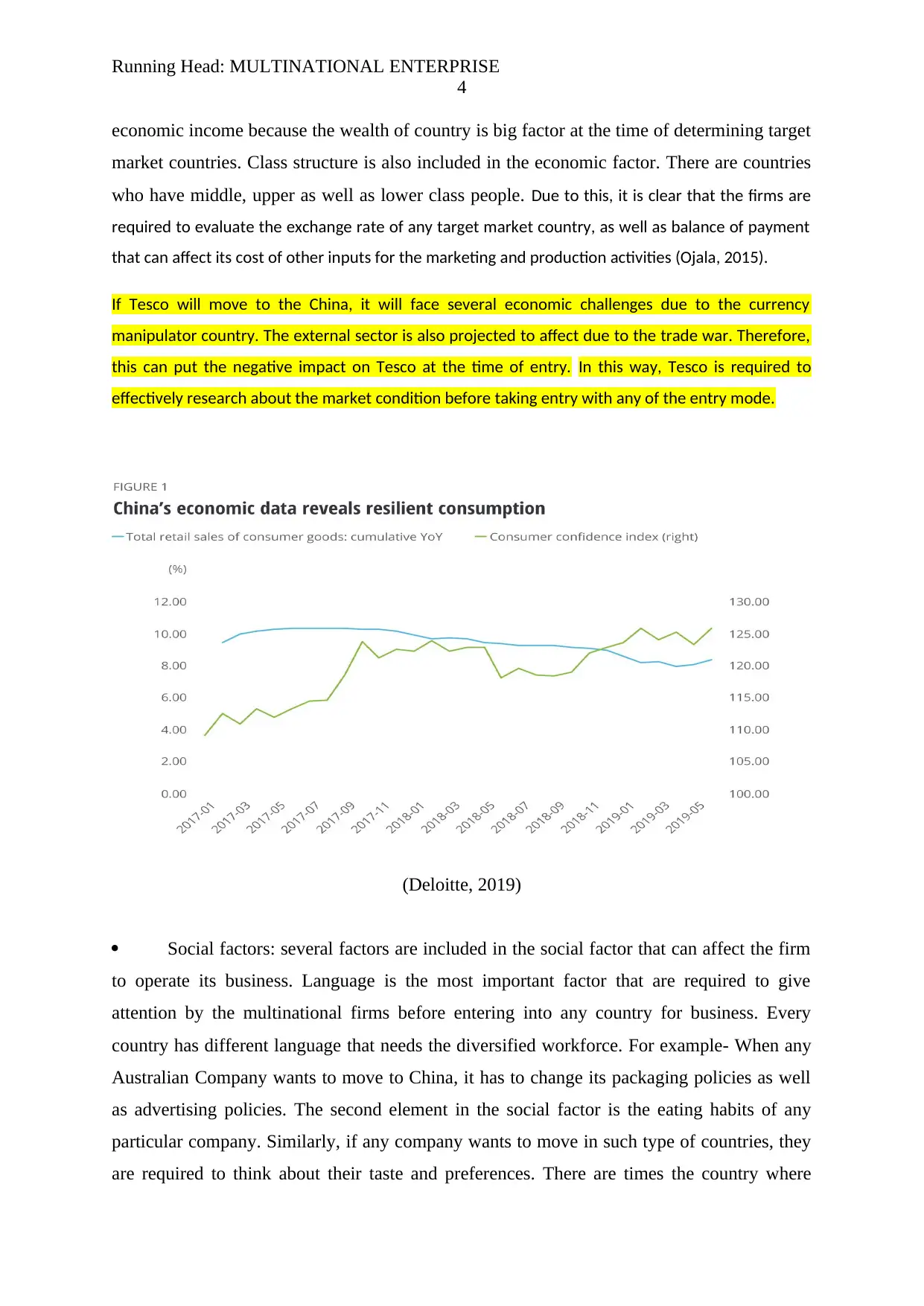
Running Head: MULTINATIONAL ENTERPRISE
4
economic income because the wealth of country is big factor at the time of determining target
market countries. Class structure is also included in the economic factor. There are countries
who have middle, upper as well as lower class people. Due to this, it is clear that the firms are
required to evaluate the exchange rate of any target market country, as well as balance of payment
that can affect its cost of other inputs for the marketing and production activities (Ojala, 2015).
If Tesco will move to the China, it will face several economic challenges due to the currency
manipulator country. The external sector is also projected to affect due to the trade war. Therefore,
this can put the negative impact on Tesco at the time of entry. In this way, Tesco is required to
effectively research about the market condition before taking entry with any of the entry mode.
(Deloitte, 2019)
Social factors: several factors are included in the social factor that can affect the firm
to operate its business. Language is the most important factor that are required to give
attention by the multinational firms before entering into any country for business. Every
country has different language that needs the diversified workforce. For example- When any
Australian Company wants to move to China, it has to change its packaging policies as well
as advertising policies. The second element in the social factor is the eating habits of any
particular company. Similarly, if any company wants to move in such type of countries, they
are required to think about their taste and preferences. There are times the country where
4
economic income because the wealth of country is big factor at the time of determining target
market countries. Class structure is also included in the economic factor. There are countries
who have middle, upper as well as lower class people. Due to this, it is clear that the firms are
required to evaluate the exchange rate of any target market country, as well as balance of payment
that can affect its cost of other inputs for the marketing and production activities (Ojala, 2015).
If Tesco will move to the China, it will face several economic challenges due to the currency
manipulator country. The external sector is also projected to affect due to the trade war. Therefore,
this can put the negative impact on Tesco at the time of entry. In this way, Tesco is required to
effectively research about the market condition before taking entry with any of the entry mode.
(Deloitte, 2019)
Social factors: several factors are included in the social factor that can affect the firm
to operate its business. Language is the most important factor that are required to give
attention by the multinational firms before entering into any country for business. Every
country has different language that needs the diversified workforce. For example- When any
Australian Company wants to move to China, it has to change its packaging policies as well
as advertising policies. The second element in the social factor is the eating habits of any
particular company. Similarly, if any company wants to move in such type of countries, they
are required to think about their taste and preferences. There are times the country where
Secure Best Marks with AI Grader
Need help grading? Try our AI Grader for instant feedback on your assignments.

Running Head: MULTINATIONAL ENTERPRISE
5
business want to do its selling have high number of regional differences that are required to
be taken in consideration Azeem et al, 2018).In addition to this, personality and culture also
continues to shape the consumer behavior in different regions of the country. It is also
essential for the multinational enterprises to consider the psychological as well as societal
factors that can influence the buying decisions in the country (Ang, Benischke and Doh,
2015).
It is found that the China’s supermarket growth is projected to grow by 2022. However, the
online market will get the more growth due to the shift of consumers to purchase online. In
this way, Tesco is required to expand its online segment if it wants to move to China.
Channel Change in Value
(CNY)
Change in Value
(%)
Online 929.9bn 285.5%
Supermarkets 719bn 44.2%
Convenience 672.9bn 65.5%
Hypermarkets 221.7bn 12.0%
Environmental factors: In the recent time, environmental factors also play the significant role.
Environmental factors can have both positive as well as negative effect on the multinational
enterprise. There are several countries who tend to be regularly affected by the natural
disasters such as earthquakes and typhoons. Due to this, it is essential for the companies to
take care of such things before moving to any country (De Villa, Rajwani and Lawton, 2015).
There are times when multinational enterprise knows that it will be too difficult for them to
tap the foreign market. In such a case, they are required to choose the potential partner that
belongs to the perspective country. For example- if any retailing supermarket wants to enter
into Australia. It will too difficult for it to tap the market due to the stiff competition and
presence of strong players. In such a situation, it is beneficial to know the local business
customers as well as practices (Schu, Morschett and Swoboda, 2016).
Government of China has also made the laws in order to protect the environment. Therefore,
it is essential for the firm to know the CSR activities or sustainability practices of China. In
5
business want to do its selling have high number of regional differences that are required to
be taken in consideration Azeem et al, 2018).In addition to this, personality and culture also
continues to shape the consumer behavior in different regions of the country. It is also
essential for the multinational enterprises to consider the psychological as well as societal
factors that can influence the buying decisions in the country (Ang, Benischke and Doh,
2015).
It is found that the China’s supermarket growth is projected to grow by 2022. However, the
online market will get the more growth due to the shift of consumers to purchase online. In
this way, Tesco is required to expand its online segment if it wants to move to China.
Channel Change in Value
(CNY)
Change in Value
(%)
Online 929.9bn 285.5%
Supermarkets 719bn 44.2%
Convenience 672.9bn 65.5%
Hypermarkets 221.7bn 12.0%
Environmental factors: In the recent time, environmental factors also play the significant role.
Environmental factors can have both positive as well as negative effect on the multinational
enterprise. There are several countries who tend to be regularly affected by the natural
disasters such as earthquakes and typhoons. Due to this, it is essential for the companies to
take care of such things before moving to any country (De Villa, Rajwani and Lawton, 2015).
There are times when multinational enterprise knows that it will be too difficult for them to
tap the foreign market. In such a case, they are required to choose the potential partner that
belongs to the perspective country. For example- if any retailing supermarket wants to enter
into Australia. It will too difficult for it to tap the market due to the stiff competition and
presence of strong players. In such a situation, it is beneficial to know the local business
customers as well as practices (Schu, Morschett and Swoboda, 2016).
Government of China has also made the laws in order to protect the environment. Therefore,
it is essential for the firm to know the CSR activities or sustainability practices of China. In
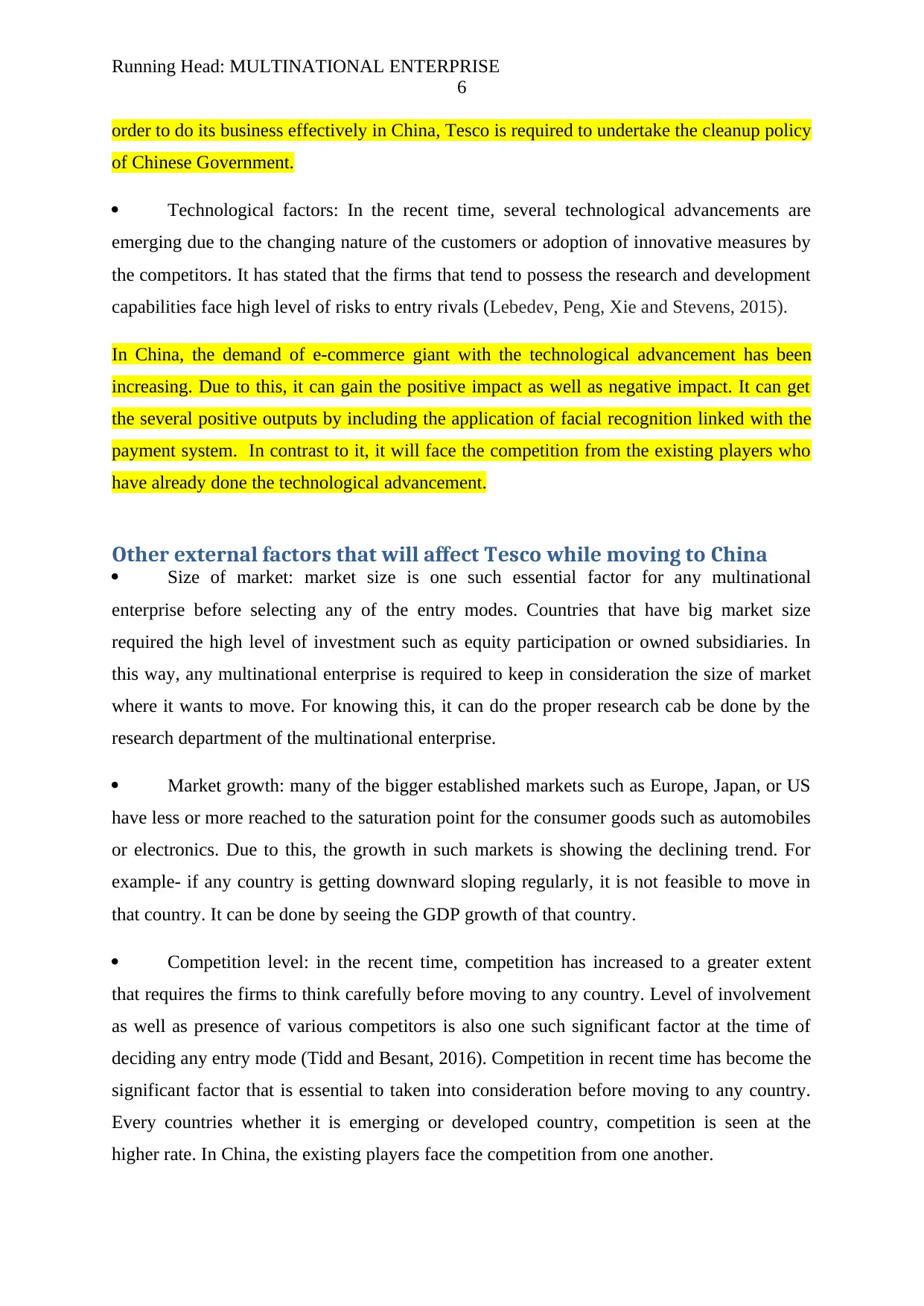
Running Head: MULTINATIONAL ENTERPRISE
6
order to do its business effectively in China, Tesco is required to undertake the cleanup policy
of Chinese Government.
Technological factors: In the recent time, several technological advancements are
emerging due to the changing nature of the customers or adoption of innovative measures by
the competitors. It has stated that the firms that tend to possess the research and development
capabilities face high level of risks to entry rivals (Lebedev, Peng, Xie and Stevens, 2015).
In China, the demand of e-commerce giant with the technological advancement has been
increasing. Due to this, it can gain the positive impact as well as negative impact. It can get
the several positive outputs by including the application of facial recognition linked with the
payment system. In contrast to it, it will face the competition from the existing players who
have already done the technological advancement.
Other external factors that will affect Tesco while moving to China
Size of market: market size is one such essential factor for any multinational
enterprise before selecting any of the entry modes. Countries that have big market size
required the high level of investment such as equity participation or owned subsidiaries. In
this way, any multinational enterprise is required to keep in consideration the size of market
where it wants to move. For knowing this, it can do the proper research cab be done by the
research department of the multinational enterprise.
Market growth: many of the bigger established markets such as Europe, Japan, or US
have less or more reached to the saturation point for the consumer goods such as automobiles
or electronics. Due to this, the growth in such markets is showing the declining trend. For
example- if any country is getting downward sloping regularly, it is not feasible to move in
that country. It can be done by seeing the GDP growth of that country.
Competition level: in the recent time, competition has increased to a greater extent
that requires the firms to think carefully before moving to any country. Level of involvement
as well as presence of various competitors is also one such significant factor at the time of
deciding any entry mode (Tidd and Besant, 2016). Competition in recent time has become the
significant factor that is essential to taken into consideration before moving to any country.
Every countries whether it is emerging or developed country, competition is seen at the
higher rate. In China, the existing players face the competition from one another.
6
order to do its business effectively in China, Tesco is required to undertake the cleanup policy
of Chinese Government.
Technological factors: In the recent time, several technological advancements are
emerging due to the changing nature of the customers or adoption of innovative measures by
the competitors. It has stated that the firms that tend to possess the research and development
capabilities face high level of risks to entry rivals (Lebedev, Peng, Xie and Stevens, 2015).
In China, the demand of e-commerce giant with the technological advancement has been
increasing. Due to this, it can gain the positive impact as well as negative impact. It can get
the several positive outputs by including the application of facial recognition linked with the
payment system. In contrast to it, it will face the competition from the existing players who
have already done the technological advancement.
Other external factors that will affect Tesco while moving to China
Size of market: market size is one such essential factor for any multinational
enterprise before selecting any of the entry modes. Countries that have big market size
required the high level of investment such as equity participation or owned subsidiaries. In
this way, any multinational enterprise is required to keep in consideration the size of market
where it wants to move. For knowing this, it can do the proper research cab be done by the
research department of the multinational enterprise.
Market growth: many of the bigger established markets such as Europe, Japan, or US
have less or more reached to the saturation point for the consumer goods such as automobiles
or electronics. Due to this, the growth in such markets is showing the declining trend. For
example- if any country is getting downward sloping regularly, it is not feasible to move in
that country. It can be done by seeing the GDP growth of that country.
Competition level: in the recent time, competition has increased to a greater extent
that requires the firms to think carefully before moving to any country. Level of involvement
as well as presence of various competitors is also one such significant factor at the time of
deciding any entry mode (Tidd and Besant, 2016). Competition in recent time has become the
significant factor that is essential to taken into consideration before moving to any country.
Every countries whether it is emerging or developed country, competition is seen at the
higher rate. In China, the existing players face the competition from one another.
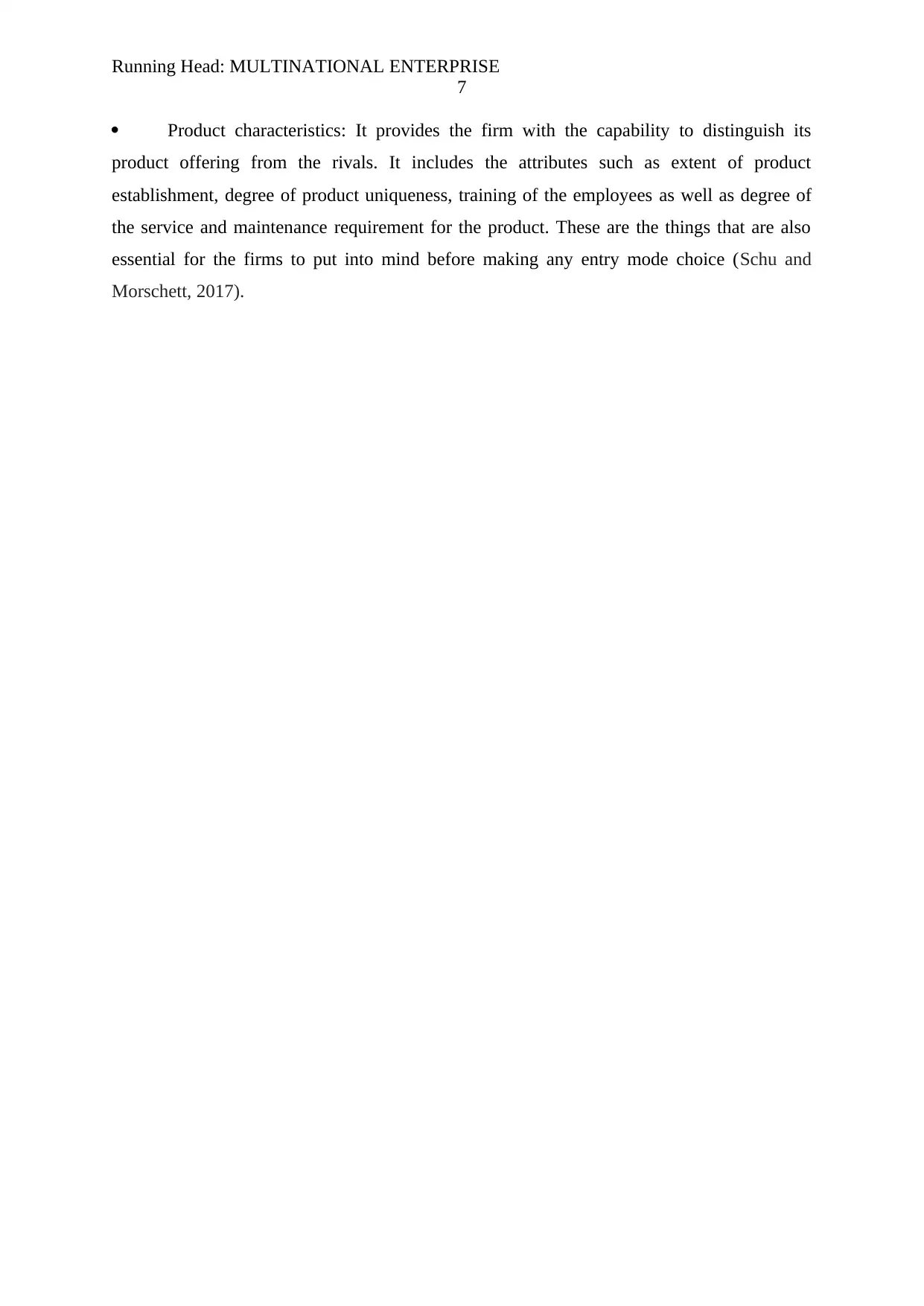
Running Head: MULTINATIONAL ENTERPRISE
7
Product characteristics: It provides the firm with the capability to distinguish its
product offering from the rivals. It includes the attributes such as extent of product
establishment, degree of product uniqueness, training of the employees as well as degree of
the service and maintenance requirement for the product. These are the things that are also
essential for the firms to put into mind before making any entry mode choice (Schu and
Morschett, 2017).
7
Product characteristics: It provides the firm with the capability to distinguish its
product offering from the rivals. It includes the attributes such as extent of product
establishment, degree of product uniqueness, training of the employees as well as degree of
the service and maintenance requirement for the product. These are the things that are also
essential for the firms to put into mind before making any entry mode choice (Schu and
Morschett, 2017).
Paraphrase This Document
Need a fresh take? Get an instant paraphrase of this document with our AI Paraphraser
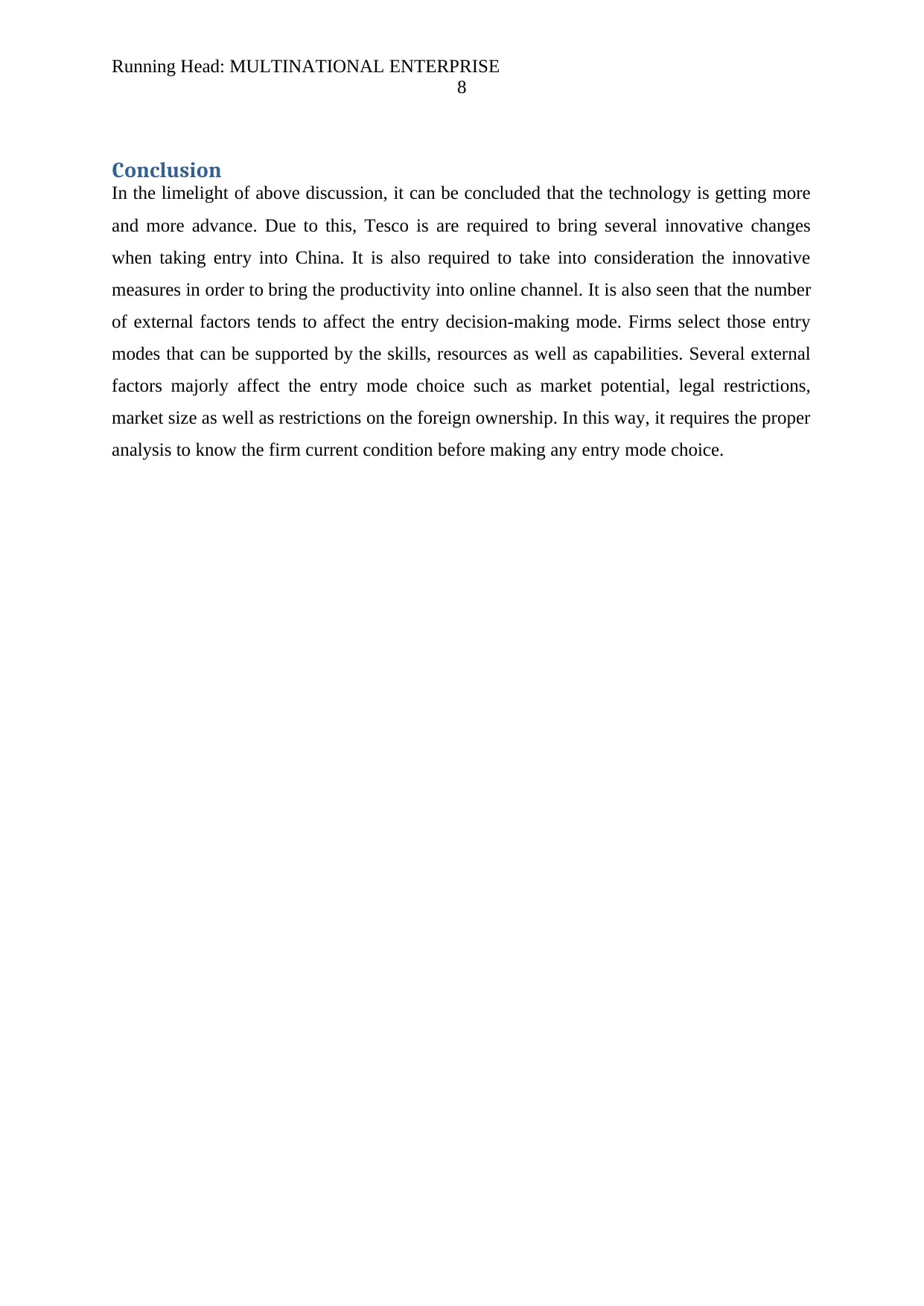
Running Head: MULTINATIONAL ENTERPRISE
8
Conclusion
In the limelight of above discussion, it can be concluded that the technology is getting more
and more advance. Due to this, Tesco is are required to bring several innovative changes
when taking entry into China. It is also required to take into consideration the innovative
measures in order to bring the productivity into online channel. It is also seen that the number
of external factors tends to affect the entry decision-making mode. Firms select those entry
modes that can be supported by the skills, resources as well as capabilities. Several external
factors majorly affect the entry mode choice such as market potential, legal restrictions,
market size as well as restrictions on the foreign ownership. In this way, it requires the proper
analysis to know the firm current condition before making any entry mode choice.
8
Conclusion
In the limelight of above discussion, it can be concluded that the technology is getting more
and more advance. Due to this, Tesco is are required to bring several innovative changes
when taking entry into China. It is also required to take into consideration the innovative
measures in order to bring the productivity into online channel. It is also seen that the number
of external factors tends to affect the entry decision-making mode. Firms select those entry
modes that can be supported by the skills, resources as well as capabilities. Several external
factors majorly affect the entry mode choice such as market potential, legal restrictions,
market size as well as restrictions on the foreign ownership. In this way, it requires the proper
analysis to know the firm current condition before making any entry mode choice.
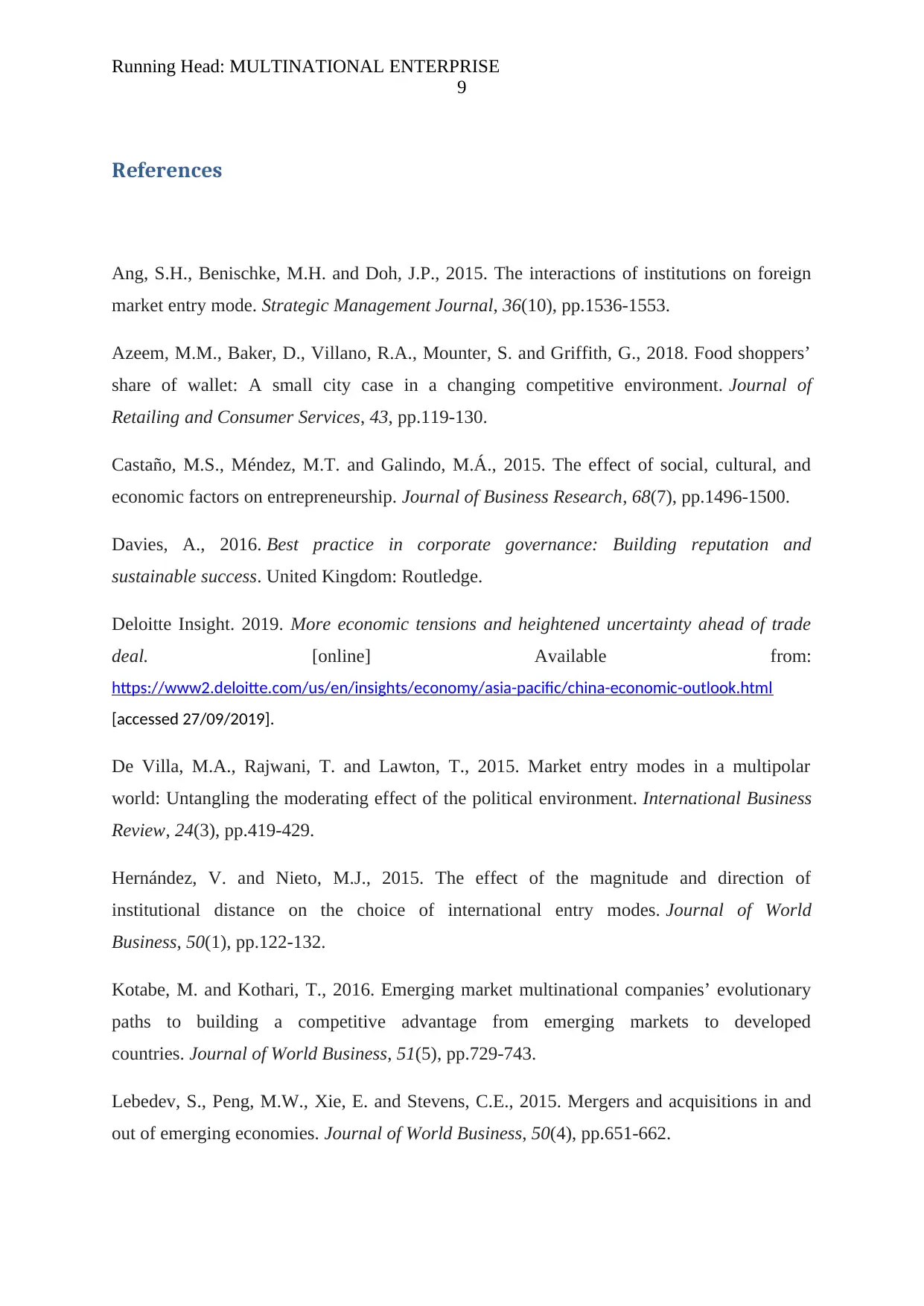
Running Head: MULTINATIONAL ENTERPRISE
9
References
Ang, S.H., Benischke, M.H. and Doh, J.P., 2015. The interactions of institutions on foreign
market entry mode. Strategic Management Journal, 36(10), pp.1536-1553.
Azeem, M.M., Baker, D., Villano, R.A., Mounter, S. and Griffith, G., 2018. Food shoppers’
share of wallet: A small city case in a changing competitive environment. Journal of
Retailing and Consumer Services, 43, pp.119-130.
Castaño, M.S., Méndez, M.T. and Galindo, M.Á., 2015. The effect of social, cultural, and
economic factors on entrepreneurship. Journal of Business Research, 68(7), pp.1496-1500.
Davies, A., 2016. Best practice in corporate governance: Building reputation and
sustainable success. United Kingdom: Routledge.
Deloitte Insight. 2019. More economic tensions and heightened uncertainty ahead of trade
deal. [online] Available from:
https://www2.deloitte.com/us/en/insights/economy/asia-pacific/china-economic-outlook.html
[accessed 27/09/2019].
De Villa, M.A., Rajwani, T. and Lawton, T., 2015. Market entry modes in a multipolar
world: Untangling the moderating effect of the political environment. International Business
Review, 24(3), pp.419-429.
Hernández, V. and Nieto, M.J., 2015. The effect of the magnitude and direction of
institutional distance on the choice of international entry modes. Journal of World
Business, 50(1), pp.122-132.
Kotabe, M. and Kothari, T., 2016. Emerging market multinational companies’ evolutionary
paths to building a competitive advantage from emerging markets to developed
countries. Journal of World Business, 51(5), pp.729-743.
Lebedev, S., Peng, M.W., Xie, E. and Stevens, C.E., 2015. Mergers and acquisitions in and
out of emerging economies. Journal of World Business, 50(4), pp.651-662.
9
References
Ang, S.H., Benischke, M.H. and Doh, J.P., 2015. The interactions of institutions on foreign
market entry mode. Strategic Management Journal, 36(10), pp.1536-1553.
Azeem, M.M., Baker, D., Villano, R.A., Mounter, S. and Griffith, G., 2018. Food shoppers’
share of wallet: A small city case in a changing competitive environment. Journal of
Retailing and Consumer Services, 43, pp.119-130.
Castaño, M.S., Méndez, M.T. and Galindo, M.Á., 2015. The effect of social, cultural, and
economic factors on entrepreneurship. Journal of Business Research, 68(7), pp.1496-1500.
Davies, A., 2016. Best practice in corporate governance: Building reputation and
sustainable success. United Kingdom: Routledge.
Deloitte Insight. 2019. More economic tensions and heightened uncertainty ahead of trade
deal. [online] Available from:
https://www2.deloitte.com/us/en/insights/economy/asia-pacific/china-economic-outlook.html
[accessed 27/09/2019].
De Villa, M.A., Rajwani, T. and Lawton, T., 2015. Market entry modes in a multipolar
world: Untangling the moderating effect of the political environment. International Business
Review, 24(3), pp.419-429.
Hernández, V. and Nieto, M.J., 2015. The effect of the magnitude and direction of
institutional distance on the choice of international entry modes. Journal of World
Business, 50(1), pp.122-132.
Kotabe, M. and Kothari, T., 2016. Emerging market multinational companies’ evolutionary
paths to building a competitive advantage from emerging markets to developed
countries. Journal of World Business, 51(5), pp.729-743.
Lebedev, S., Peng, M.W., Xie, E. and Stevens, C.E., 2015. Mergers and acquisitions in and
out of emerging economies. Journal of World Business, 50(4), pp.651-662.
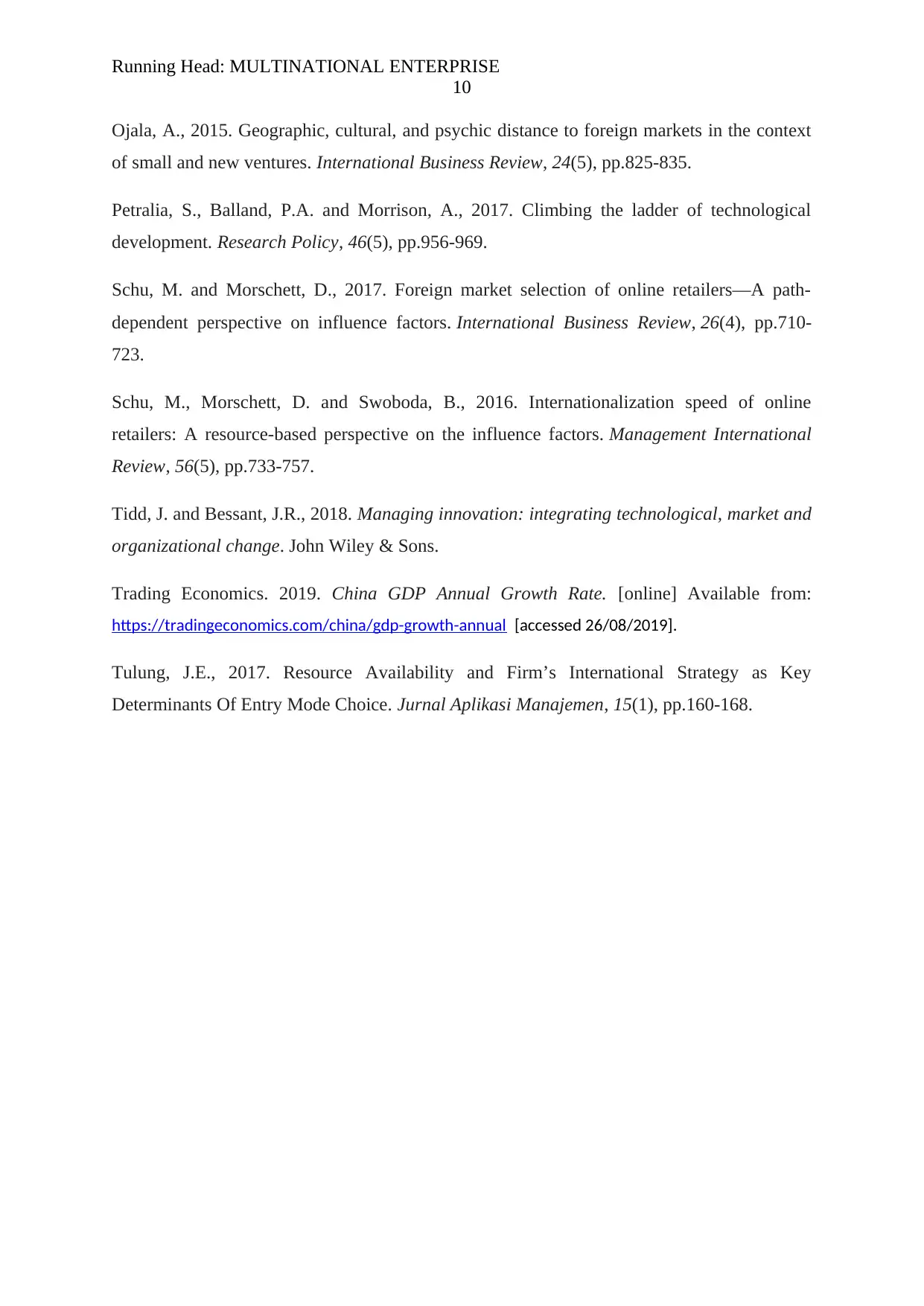
Running Head: MULTINATIONAL ENTERPRISE
10
Ojala, A., 2015. Geographic, cultural, and psychic distance to foreign markets in the context
of small and new ventures. International Business Review, 24(5), pp.825-835.
Petralia, S., Balland, P.A. and Morrison, A., 2017. Climbing the ladder of technological
development. Research Policy, 46(5), pp.956-969.
Schu, M. and Morschett, D., 2017. Foreign market selection of online retailers—A path-
dependent perspective on influence factors. International Business Review, 26(4), pp.710-
723.
Schu, M., Morschett, D. and Swoboda, B., 2016. Internationalization speed of online
retailers: A resource-based perspective on the influence factors. Management International
Review, 56(5), pp.733-757.
Tidd, J. and Bessant, J.R., 2018. Managing innovation: integrating technological, market and
organizational change. John Wiley & Sons.
Trading Economics. 2019. China GDP Annual Growth Rate. [online] Available from:
https://tradingeconomics.com/china/gdp-growth-annual [accessed 26/08/2019].
Tulung, J.E., 2017. Resource Availability and Firm’s International Strategy as Key
Determinants Of Entry Mode Choice. Jurnal Aplikasi Manajemen, 15(1), pp.160-168.
10
Ojala, A., 2015. Geographic, cultural, and psychic distance to foreign markets in the context
of small and new ventures. International Business Review, 24(5), pp.825-835.
Petralia, S., Balland, P.A. and Morrison, A., 2017. Climbing the ladder of technological
development. Research Policy, 46(5), pp.956-969.
Schu, M. and Morschett, D., 2017. Foreign market selection of online retailers—A path-
dependent perspective on influence factors. International Business Review, 26(4), pp.710-
723.
Schu, M., Morschett, D. and Swoboda, B., 2016. Internationalization speed of online
retailers: A resource-based perspective on the influence factors. Management International
Review, 56(5), pp.733-757.
Tidd, J. and Bessant, J.R., 2018. Managing innovation: integrating technological, market and
organizational change. John Wiley & Sons.
Trading Economics. 2019. China GDP Annual Growth Rate. [online] Available from:
https://tradingeconomics.com/china/gdp-growth-annual [accessed 26/08/2019].
Tulung, J.E., 2017. Resource Availability and Firm’s International Strategy as Key
Determinants Of Entry Mode Choice. Jurnal Aplikasi Manajemen, 15(1), pp.160-168.
1 out of 10
Related Documents
Your All-in-One AI-Powered Toolkit for Academic Success.
+13062052269
info@desklib.com
Available 24*7 on WhatsApp / Email
![[object Object]](/_next/static/media/star-bottom.7253800d.svg)
Unlock your academic potential
© 2024 | Zucol Services PVT LTD | All rights reserved.





